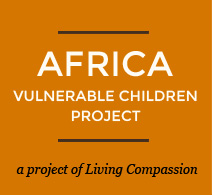The morning started with Beth’s send-off. It is amazing how intimate, yet impersonal, is the process of becoming part of the Living Compassion team in Kantolomba. Everyone who travels to participate with the project is taken in immediately as family! When it is time to go, it is as if the team is saying goodbye to someone they have known for years.
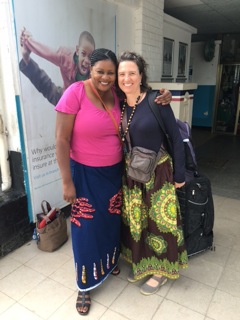
Theresa and Beth at the airport
We had one main goal for the day out at the property—to finish going through each area of the girls program, summarize where we were, and plan execution details for next week. Two weeks can go by in a flash!
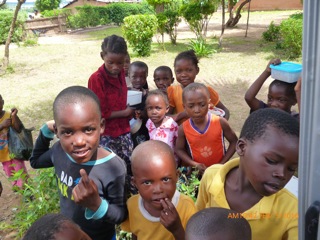
Our daily ceremonious greeting
We began by laying out all the charts we have created so far, all of the notes that have been generated in the meetings. Looking around the room, we remarked to each other that we have come far already! The charts are a representation of much experience, much trial and error, much information gathered over many years. And it is clear we are still at the infancy stages of what we can all sense will be a grand program. We learned recently that when giant bamboo is planted it “does nothing” for 5 years and then grows 90 feet in 6 weeks! It would be easy to say the bamboo grows to 90 feet in 6 weeks but, of course, it does not. It takes 5 years. It seems we are just starting to see the sprouting of the girls program. Very exciting!
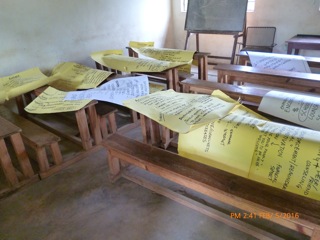
Years of experience on a room full of papers
Ethel had not been at the property that day, and at one point came by to speak with Theresa. Theresa provides leadership to the whole community. If someone faces a challenge, they seek out Theresa. Ethel’s son graduated from grade 12 last year and is enrolling in a mechanical engineering course at a local college. She had run into some difficulties and asked Theresa for her assistance.
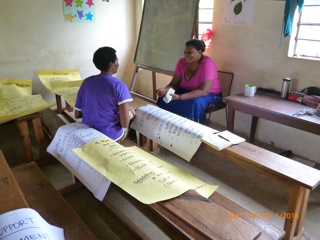
Ethel and Theresa meeting
It is lovely to be here long enough to feel the solid rhythms of the program. The grade 8 girls were meeting with Joy to go over their schoolwork before reporting to the government school at noon.
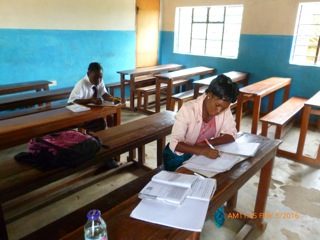
Susan finishes up her work as Joy checks the work of the other students, just completed.
The meeting accomplished exactly what we had hoped—we looked together at the summary notes of each area, confirmed agreement on many points, and, in the process, found a few key details we had missed. It is fun and energizing to create a program with a room full of people who are not “experts” on the subject. We have not brought in any sustainable development trainers, no specialists in supporting adolescent girls, no professional academicians, and yet it is clear that we are the group of people most qualified to create what we are creating! Life informs!
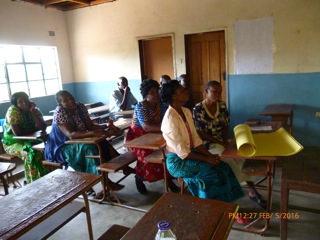
Last meeting of the week
We saw earlier in the week that many of the students are “sight” reading. When they encounter a word they do not know, they seem to lack the skills to sound it out. We realized that one of the tools we brought along this time is perfect for practicing phonics. It is a set of books with an electronic pointer. The pointer can read the book to you, can read a word, can say the name of a letter and spell a word for you, or can pronounce the sound of the letter and sound out a word. Excellent! The teachers had great fun learning how to use it.
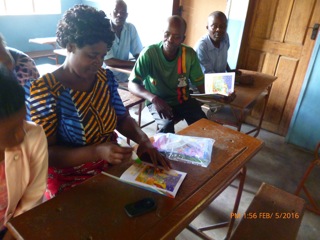
Beatrice learning the new reading tool
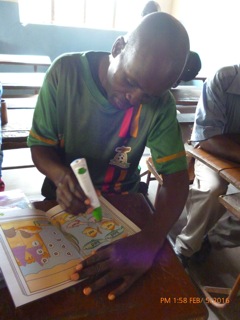
Now Elias
Joy is the one member of the team who does not live in Kantolomba. She lives in the area just next door, with similar economic circumstances. She would like to be closer to the project and more available to the girls off-hours. There is a little home on the property that is not in use. She asked Theresa if the project might consider allowing her to live in the house. As we spoke about it, an even larger, more fun possibility arose. That house is ready for its next incarnation. What if we save the parts of it that can be saved but make it quite a bit larger and have it be the headquarters for the girls program? Joy would live there, and there would be a second bedroom with two sets of bunk beds and a large sitting room that would be a resource center for the girls, a safe haven, and a place they come to study in the evenings. It would be a large step we did not think we could take for some years—offering around-the-clock support, rather than just during the day. As we have alluded to, these young girls face countless challenges in the community, many of which are most prevalent at night. Joy would be available for the girls all the time, and the house would be a place to stay in crisis and/or simply for extra support.
When the two sets of bunk beds were mentioned, we asked Theresa whether there would really be 4 girls wanting to stay on any given night? “More!” she assured us. And Joy is, well, overjoyed! She does not have a family of her own, quite rare in Zambian culture, and has a giant heart for these girls. Seems we have a win-win in the making.
There is much to work out and it may not be this trip that it all comes together, but it is yet another beautiful seed that will grow when its time has come.
Over lunch we had another good, hard rain, allowing the lovely experience of sharing our meal together in silence (if you don’t count the drumming of the water on the tin roof as breaking the silence!)
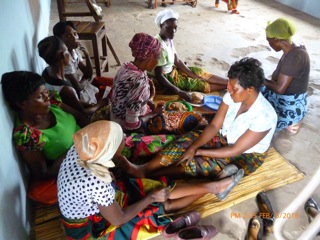
Lunch
After lunch the girls began to gather.
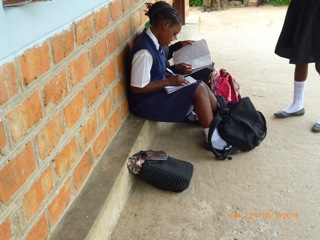
Rachel working on homework as she waits for the other girls to come
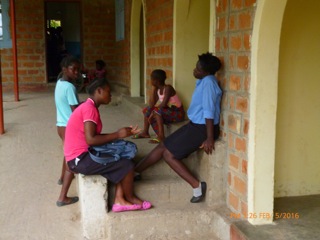
A little social time before heading in
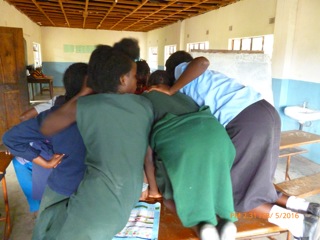
As the teachers were gathering everyone, we showed a handful of girls the new reading tool. So fun!
After taking roll with the whole group, the teachers separated the girls into grade-levels and dispersed for the day’s academic support.
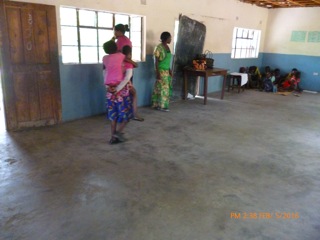
One of Susan’s (whose wheelchair was outside) classmates makes sure she gets over to where her fellow grade 5 girls were meeting.
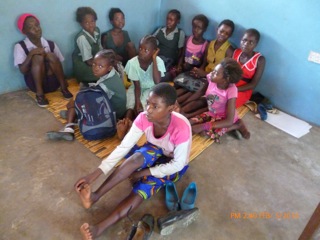
Grade 5’s
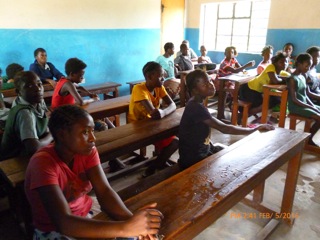
Grade 6’s
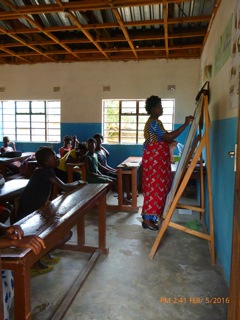
Beatrice with the grade 6 girls
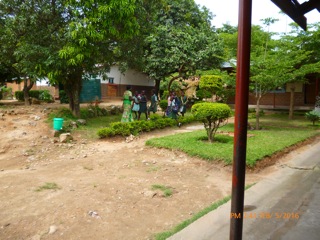
One lucky group got the “outdoor classroom.”
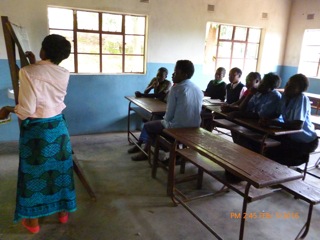
And Joy had the older girls.
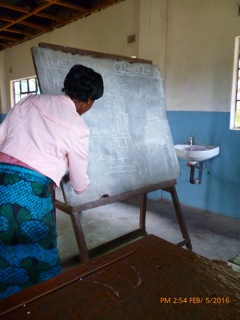
They were working on algebra, using fractions!
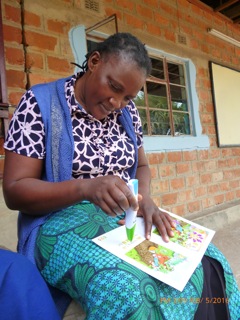
Before we left for the day, Veronica had a go at the new reader. It is universally popular!
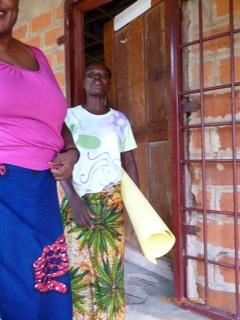
And Pauline is ever-patient in our Bemba lessons. Today we were getting a tutorial on how to properly express “yes.” It is all in the subtle, yet very exact movement of the head and a melodic sound that, if we were to attempt to spell it would be something like: eh, eh… We think you might have had to be born here to do it but it certainly provided much laughter for all!
On the way home we followed up asking Theresa about Ethel’s son. We had spoken to Beatrice earlier in the week who told us about her son in medical school, another studying to be a teacher and a third who just passed grade 12 exams. We remarked that this seems new. As far as we know, no children of cooperative members have previously enrolled in college programs. Theresa was clear: “It is because of the exposure. If you sit at home and brew kichasu (the local “moonshine” liquor), try to get enough kwacha to eat, then go to bed at night, you don’t know what is possible. You will never see the value of education.” She explained that right from the start one of the values talked about on a daily basis on the property is the importance of education. It is heartening that the cooperative members are now seeing that value, and are able to put together the finances to make it happen! This will have a huge impact of the quality of life for their children as well as their own.
Another transformative day!
